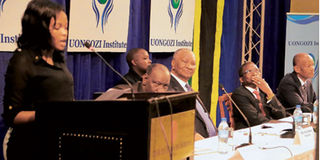What is the meaning of Leadership?

A University of Dar es Salaam student, Ms Redemptor Benedict, a winner of essay writing compatition pitting students from across East Africa, delivers her winning piece during a syposium organised by Uongozi Institute in Dar es Salaam recently. PHOTO | FILE
What you need to know:
- Last year Uongozi Institute organised an essay writing competition for youth in East Africa. Over 260 youngsters presented their pieces and after judges went through them a winner was awarded $2,000 and a certificate. Here is the winning essay
Dar es Salaam. What does it mean to be a leader? Is it the title? To me, it is more than that.
No doubt that leadership titles are important, but they do not have much value when it comes to leading. True leadership cannot be awarded, appointed or assigned. It is not primarily a formal position either.
There have seen great leaders who did not hold high positions — for example, Martin Luther King Jr. It comes only from influence and it has to be earned. Being a leader in a mass of people is more than just having the name “captain”.
In fact, you can be a leader in your family, in your neighbourhood, or in your society, all without having a title.
It’s not the position that makes the leader; it’s the leader that makes the position. However, it is also true that people who are awarded, appointed or assigned leadership positions, have a key role to play in a society, and if true, leadership is not within them, then at least some effort is needed to build their leadership capacity or else the teams they lead are doomed.
To me, a leader is someone who demonstrates extraordinary dedication to his or her team, and will do whatever it takes to better the team as a whole. A leader infuses a sense of positivity and directs others to reach a specified goal. Leadership therefore is ‘that process in which an individual influences an organised group or followers to attain a common goal’.
The goal is attained by mutual cooperation and cohesive behaviour. The ends of leadership involve getting results through others, and the means of leadership involve the ability to build cohesive, goal-oriented teams.
Leadership is more often than not about “soft skills” rather than hard skills. Knowledge is power and naturally, for those who believe power is the essence of leadership will assume that those who possess more knowledge and intelligence will make good leaders. This is not always the case, and you may find brilliant scientists and philosophers whose ability to think is so high, but whose ability to lead is very low. Yes, a knowledgeable leader who understands what drives the bottom line is valuable. However, it is the leader who can get others to perform at their best who ultimately creates a winning team. Good leaders are therefore those who build teams to get results across a variety of situations.
Few things are more important to human activity and its outcomes than leadership. The weakest link in government, in a business, in a movement or even in a family is leadership.
Leadership helps our nation through times of peril, makes a business organisation successful and enables a movement to fulfil its mission. Leadership of parents enables children to grow strong and healthy and become productive adults.
It is not technology; it is not tools or equipment; it is not facilities; it is not the skills of employees; it is not systems and procedures; it is leadership.
Without leadership, things drift along. Without leadership, a group of human beings quickly degenerates into argument and conflict, because we see things in different ways and lean toward different solutions.
Leadership helps us to point in the same direction and harness our efforts jointly.
I have to point out, however, that leadership can be used for good or ill. Adolf Hitler, one of history’s most notorious dictators was a leader of the German people, who set an evil direction. Many would argue that he had great leadership skills, but he put them to terrible use.
Sometimes people in business use leadership skills to exploit others. Sometimes people in charitable organisations use leadership skills to benefit themselves rather than the people they are supposed to help. So leadership can be misused to pursue bad ends.
I believe the supreme quality for leadership is integrity. It reflects a deep commitment to do the right thing for the right reason, regardless of the circumstances.
Leaders with integrity are incorruptible and incapable of breaking the trust of those who have confided in them. However, I also believe a good leader must possess a combination of many varying qualities.
A great leader should have integrity, vision, courage, humility, creativity, conviction, trustworthiness, fairness to mention but a few, all of which are crucial leadership qualities.
Ms Benedict is a second year student at UDSM pursuing sociology




